Corpus Fun and Games with Sporcle
Hanna Kryszewska and Paul Davis, Poland and UK
Hanna Kryszewska is senior lecturer at the University of Gdańsk, Poland, teacher trainer, co-author of course books, resource books and teacher training materials, and editor of Humanising Language Teaching old.hltmag.co.uk
E-mail: hania.kryszewska@pilgrims.co.uk
Paul Davis is freelance teacher, trainer and writer. He has co-authored “Dictation”, “More Grammar Games” and “Ways of doing” (CUP). His latest book is “The Company Words Keep” (DELTA Publishing). E-mail: paul25davis@hotmail.com
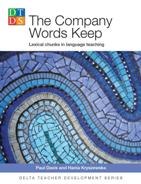
Menu
Introduction
Practical idea 1
More practical ideas
If you haven’t come across Sporcle (www.sporcle.com/games/) it is a site with lots of games (of variable quality) that are adaptable to the ELT class. What we found interesting was the 4 games that used corpus data:
Can you name the most commonly used words in the English language?
Can you name the 27 most common English verbs?
Can you name the most common two-letter English words?
Can you name the most common English words, grouped alphabetically by 10's?
It might be a good idea to have a look at the games before reading the rest of this article:
www.sporcle.com/games/g/common_english_words
www.sporcle.com/games/mikschmvlg/english_verbs
www.sporcle.com/games/boyochels/twoletterwords
www.sporcle.com/games/MrChewypoo/the-2000-most-common-english-words
Here is how we used “Can you name the most commonly used words in the English language?”
Before class
Depends on what you have available. If you have a data projector and internet connection this works well as a whole class activity. But it can be used in groups in a computer lab or using the learners own devices.
In class
Play the game (about 12 minutes)
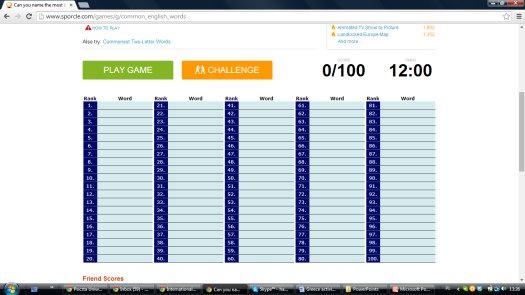
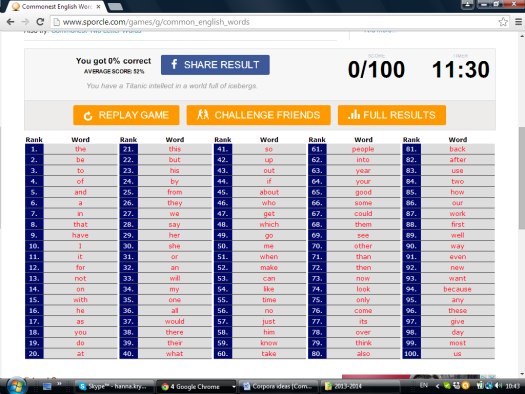
Follow-ups
- One possibility is for the learners try to make sentences containing as many words as possible from the pool/corpus. This can be a competitive activity.
- Or they can make sentences using only the words from the top 100 – winner is the group that uses the most words.
- With sophisticated groups we have asked them why they think these words are so important (lots of modals/deixis/English loves prepositions etc).
Below are screen captures of the other three games. They are all usable in class and having a follow up activity helps: e.g. when learners have played ‘Can you name the 27 most common English verbs?’ they prepare / write a text about themselves using all the verbs, or as many verbs as possible.
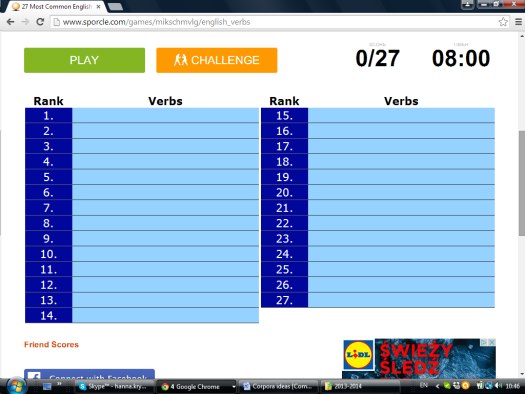
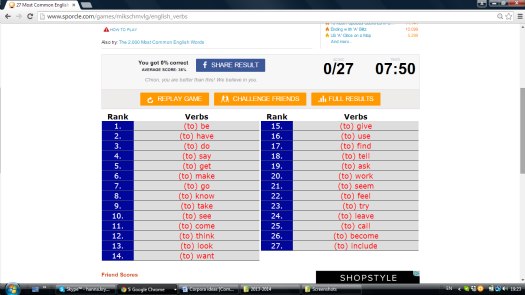
Below is a screen capture of ‘Can you name the most common two-letter English words?’.
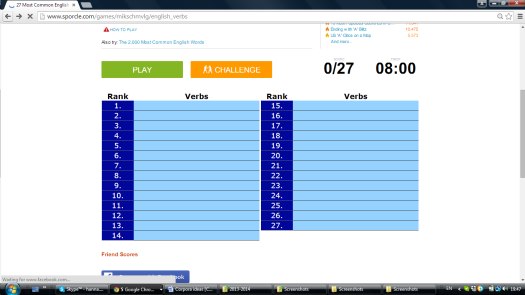
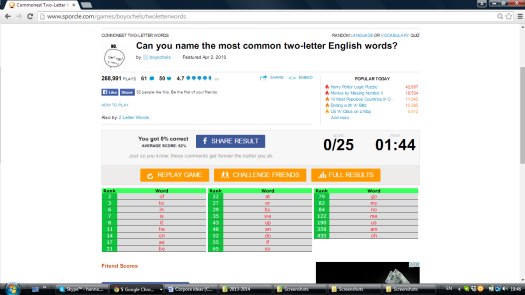
When the learners have played ‘Can you name the most common two-letter English words?’ (see screen capture above) learners write sentences / a short paragraph / story using all the two letter words. They will obviously need more words, so let them use three letter words and then four letter words and so on. But a three letter word is to be the first choice, a four letter word the second, etc. If you want to run this activity as a competition learners score more points if they used two and three letter words only, if only two, three and four letter words even fewer etc.
Example
If he is so mad it is bad. We are as mad as he is.
The fourth and last game on Sporcle that uses data from a corpus is called ‘Can you name the most common English words, grouped alphabetically by 10's?’ is more advanced but is a good vocabulary exercise.
Learners suggest words which they think are among the 2000 most common words. At the time of writing we haven’t had a chance to use it in class but it looks like it has possibilities.

Please check the Creative Methodology for the Classroom course at Pilgrims website.
Please check the Methodology & Language for Secondary Teachers course at Pilgrims website.
Please check the Teaching Advanced Students course at Pilgrims website.


|